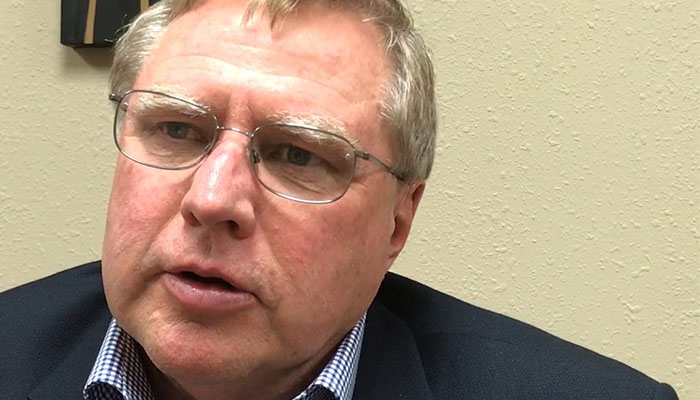Wichita businessman and Republican Mark Hutton made a campaign stop in Hays Wednesday on a multi-city tour after declaring his candidacy for governor Monday.
Hutton began his company, Hutton Construction, in 1992 in Wichita, which has grown to 250 employees who work on commercial and industrial projects across the Midwest.
Hutton has spent two terms in the Kansas Legislature, serving the 105th District that represents northwest Wichita.
Hutton said his platform begins with budget reform, and he hoped to see more collaboration between the Legislature and the governor’s office in forming the budget.
“Right now, it is this game,” he said. “The governor prepares the budget in secrecy and dumps it in the lap of the Legislature, who has a limited amount of time to look at a very large budget. That process does not yield a good benefit to the taxpayers of this state.”
He said the governor should be more business-like and detailed with the budget, a lack of which in the past has caused a credibility gap. Priorities need to established, he said.
“Government has core functions that we are obligated to step up to, both morally and fiscally,” he said. “We need to look at that.”
On the issue of K-12 funding, Hutton who has a son who is high school vice principal, said he would like to see Kansas school districts provide more data to be used in the budget process.
“We need to determine a correlation of dollars to outcomes to determine where to best spend the money,” he said.
In terms of higher education, Hutton acknowledged Gov. Sam Brownback had cut millions from higher education budgets. However, he hoped the higher education institutions could work with businesses in the state to better prepare students for the jobs that are available.
“I am a businessman,” he said. “When I hire a student from a university, I knew I am going to have to invest more money in them because they are not coming out prepared for the job I need them to do.”
He said if the universities would step up and meet the needs of industry, the private sector would step up to help colleges reduce costs and sponsor programs.
Hutton hopes to improve the climate for businesses in Kansas in order to grow the Kansas economy. He said economic development and industry recruiting has been lacking in Kansas.
“It goes back to what I call elephant hunting,” he said. “I think the administration in an attempt to validate the tax package they had, which essentially they were relying on for their economic development incentive, (went) out and looked for the big companies. When you look at Kansas, rural Kansas needs jobs too, and the big elephants aren’t going to go to small towns.”
Kansas needs to recruit the right-size businesses for the right-size communities in Kansas and recruit on the state’s work ethic, Hutton said.
Rather than incentive programs to bring new businesses to Kansas, Hutton said he prefers programs that reward businesses for creating jobs. He gave the example of the PEAK program, Promoting Employment Across Kansas, which rewards businesses once they have created Kansas jobs.
This is different from the so-called LLC loophole, which rewarded companies for jobs that were never created, Hutton said.
Hutton touched on Kansas water policy, which he said should be left in the hands of people in the agriculture industry.
“All too often, government thinks they have all the answers,” he said. “Government’s job should be to remove the obstacles out of the way to develop the good policies toward our management of water resources.”
Hutton acknowledged the Brownback administration had made cuts to state agencies and that had concentrated work on fewer employees.
“We want to make sure our employees of our state are valued for the contribution they make to the services we make to our No. 1 customers, the taxpayers out there. Pay plays a role, but there are other issues that play a role in that. I know as a business person (it also includes) working conditions, respect for what they do and appreciation for that fact they are working at a job that is pretty darn difficult.”
He said you improve the efficiency of a business with its frontline staff, and he would do the same with the state.

